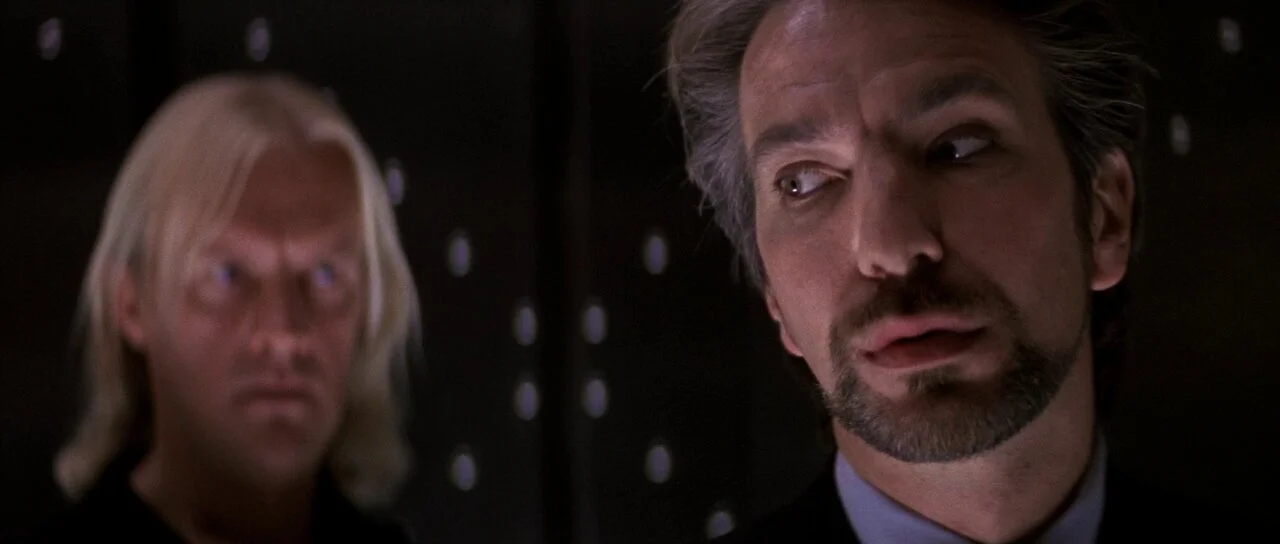Die Hard (dir. John McTiernan, 1988)- review
Download the Die Hard screenplay here for personal, private use.
Die Hard presents an unusually complex narrative for an action film, and indeed more so than its source novel, Nothing Lasts Forever by Roderick Thorp. The richness of narrative offers a possible explanation for the film’s lasting influence, since it offers such a wide variety of elements to draw upon. In 1996 Empire magazine went so far as to publish a ‘If You At First You Don’t Succeed, Die, Die Again’ cheat sheet, providing five requiments for imitators: “a location in peril; a plot in which renegade [blank]s take [blank] hostage; a misunderstood hero; a 'cerebral but demented villain (preferably English)'; and a distinctive garment for the hero.”
Yet, in 1988, Bruce Willis's John McClane made an unusual action hero, neither an Übermensch like Schwarzenegger or Stallone nor a specialist like James Bond; he epitomised the regular, vincible guy from New Jersey. However, the most profound influence of Die Hard, reaching beyond the blatant copies, arrived in the portrayal of Alan Rickman's villain, Hans Gruber, who is intelligent, efficient and charming, and unlike his many imitators, amoral rather than psychopathic. While Bruce Willis came to the role of John McClane with an established persona as a wisecracking detective from his hit television series Moonlighting, Alan Rickman proved a blank slate, with his only role in the US as the Vicomte de Valmont in the Broadway production of Les liaisons dangereuses, But the film-makers were quick to credit the debutant with creating the most imitated character in modern cinema. According to Die Hard’s screenwriter, Steven de Souza, 'Alan Rickman was just fascinating. You can't take your eyes off him, and that's very important in these films (that imitate Die Hard), which are driven by the villain." Rickman became the template for’ villainy with depth’, as critic Quentin Curtis noted, with Jeremy Irons's Simon Gruber (supposedly Hans’ brother) in the third sequel constituting, 'like so many villains before him, a pale shadow of Rickman’.
Die Hard may also be regarded as a product of the sociopolitical atmosphere of the USA in 1988. It was an election year: the selection of Ronald Reagan's successor would be seen as either an affirmation or a rejection of the policies of a president who was at once one of the most loved and one of the most loathed in American history — and a president who had specialised in playing such archetypal American good guys as the cowboys referenced in Die Hard, “Yippee-kiy-ay….” By 1988, American politics and the movies had intermingled, rooted in a legacy of “Hollywood in the 1940s, the era of Ronald Reagan's heyday there—an era of Westerns, of World War II movies and of mothers who cared for their children in patriarchal homes behind white picket fences-was melded with conservative Republican concerns of the 1980s” (Stillwelll, 1997).. Distrust of big government manifests in the inept law enforcement, while the economic threats of Europe and West Germany (Gruber’s homeland) form key plot points: at the start of the film, a Nakatomi executive jokes that since Pearl Harbor 'hadn't worked', Japan would conquer America with tape decks. Indeed, the prominence of Japan and Germany in the narrative hearkens back to World War II.
John Fiske has described the truly popular text as one which provides multiple points of reference to its audience, one which contains internal contradictions, one that is 'in a very real sense, beyond its own control’. In vanquishing the metrosexual, leftist German, Die Hard offers a standard conservative narrative, and yet an equally arresting subversive reading, with the villain as complex, charming and charismatic protagonist. Viewers who resist the overtly pro-establishment message, and the obvious physical hero, may escape by cheering on the intellectual charmer whose moment of death evades the camera’s intrusive gaze.
Áine Kim Kennedy is a London-based writer and manager of the ScriptUp blog.




